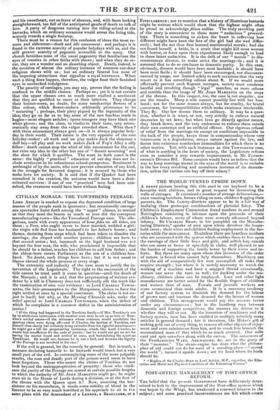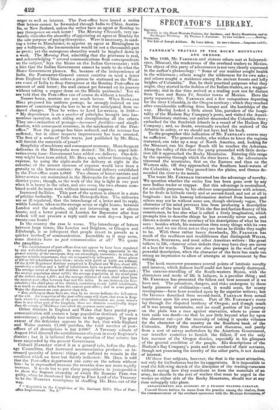POST-OFFICE MANAGEMENT OF POST-OFFICE REFORM.
THE belief that the present Government have deliberately deter- mined to halt in the improvement of the Post-office system which was begun by the Whigs, has awakened a renewed interest in the subject ; and some practical inconveniences are felt which create anger as well as interest. The Post-office have issued a notice that letters cannot be forwarded through India to China, Austra- lia, or New Zealand, unless the writer have an agent at Bombay to pay threepence on each letter ! The Morning Chronicle, very na- -turally ridicules the absurdity ofappointing an agent at Bombay for the sole purpose of paying threepence. Were it necessary, in send-
ing a letter to Manchester, to appoint an agent at Birmingham to pay a halfpenny, the inconvenience would be not a thousandth part so great ; yet the outrageous absurdity would be laughed down in
a week. The Morning Post, admitting that the grievance is real, and acknowledging "several communications from correspondents
on the subject, lays the blame on the Indian Government ; with
a hint that the Indian Government cannot be made to do what the Home Government pleases. So, because of the independence of
India, the Postmaster-General cannot contrive to send a letter from England to China unless a person be stationed on the West- ern coast of India to drop threepence at the Bombay Post-office on
account of said letter ; the mail cannot get forward on its journey without taking a copper dram on the Hindu peninsula! Yet we are told that the Post-office can of course do without a teacher.
Nearer home, matters are not much better. When ROWLAND HILL proposed his uniform postage, he strongly insisted on one means of counteracting the loss to be at first anticipated from re- duced charges. Thus he writes to Lord LICHFIELD, in 1838— " My dependence is on a number of principles brought into har-
monious operation, each aiding and strengthening all the others.
They are—reduction of postage—increased facilities—and simpli- fication, with consequent economy, in the mechanism of the Post-
office." Now the postage has been reduced, and the revenue has suffered; but in other respects improvement has been arrested. The first of a series of little tracts, just published by Mr. HILL, will furnish the materials of proofs Simplicity of machinery and consequent economy. More frequent .deliveries in the Metropolis were desired : Mr. HILL urged deli- veries every hour : Government have added one delivery. One deli- very might have been added, Mr. HILL says, without increasing the expense, by using the night-mails for delivery at night in the suburbs; or the utmost increase of expense would have been a gratuity to the letter-carriers: the additional delivery established by the Post-office costs 4,000/. Two classes of letter-carriers and
letter-sorters are maintained in the Metropolis for the general and i district posts; though, as the work of the day is light n one post when it is heavy in the other, and vice versa' the two classes com- bined could do more work without increased expense.
Increased facilities. This part of the system is almost in a state of pristine barbarity. To take the Metropolis first. The deliveries are so ill regulated; that the interchange of a letter and its reply,
-within London, takes on the average seven or eight hours; between 'London and the suburbs night not intervening, ten or eleven hours; and a letter posted in London for Bayswater after four o'clock will not procure a reply until one next day—a lapse of twenty-one hours!
In the country the case is worse. The interchange of letters between large towns, like London and Brighton, or Glasgow and Edinburgh, is so infrequent that people resort to parcels as a quicker method; of communication. Incredible as it may seem, some districts have no post communication at all ! We quote the pamphlet- . The establishment of post-offices does not appear to have been regulated by any well-defined principle. In some districts owing apparently to the
greater activity of the surveyors, they are exceedingly numerous; in others, of superior relative importance, they are comparatively infrequent. Some places of 200 or 300 inhabitants have them; others with 2,000 or 3,000 are without.
Of the 2,100 Registrars' districts comprised in England and Wales, about 400, containing a million and a half of inhabitants, have no post-offices whatever. The average extent of these 400 districts is nearly twenty square miles each ; the average population about 4,000; the average population of the chief place of the district about 1,400; and the average distance of such chief place from the nearest post-office between four and five miles. In one instance (in Lin- colnshire) the chief place of the district, containing nearly 1,000 inhabitants, is as much as sixteen miles from the nearest post-office ; and in some parts of Wales the distances are even greater than this.
"But, striking as these facts are, they by no means indicate the full extent of the evil. An inspection of the post-office maps will show, that even in Eng-
land, where the ramifications of the post-office distribution are more minute than in any other part of the kingdom, there are districts considerably larger
than the county of into which the postman never enters."
Other districts in England and Wales that have partial post- communication still contain a large population destitute of such a convenience ; probably four millions in the aggregate. The great extent of the deficiency appears in the fact, that while England and Wales contain 11,000 parishes, the total number of post-
offices of all descriptions is but 2000!, A Treasury minute of August 1841 directed the establishment of a post in every Registrar's district ; but it is believed that the operation of that minute has been suspended by the present Government.
Colonel MABERLT stated it as a general rule, before the Post- age Committee, that increased accommodation produces an in- creased quantity of letters: things are suffered to remain in the condition which we have but faintly indicated : Mr. HILL is told that the Post-office department can carry on the reform without bun: he is reproached because the revenue does not more rapidly increase. It needs but to put these propositions in juxtaposition to show the flagrant absurdity of which Sir ROBERT PEEL was guilty, when he abandoned his dutras First Lord of the Treasury m be the MABERLY mouthpiece in shuffling Mr. HILL out of the way.
• " Requisite's to office Improvemen the Completion of Mr. Rowland Hill's Plan of Post- t.



























 Previous page
Previous page